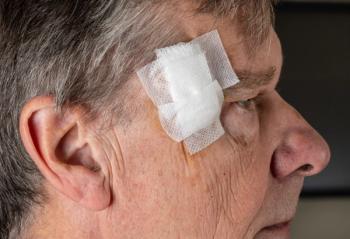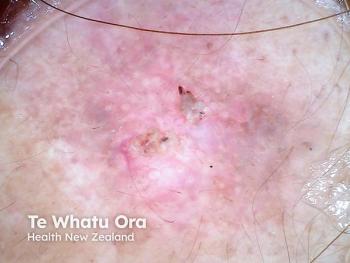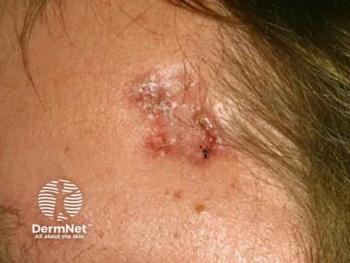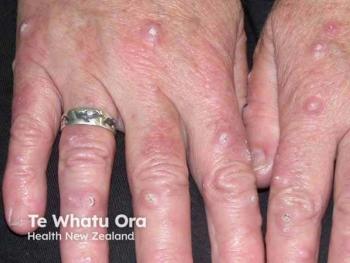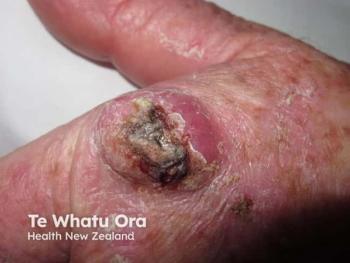
- Dermatology Times, April 2021 (Vol. 42, No. 4)
- Volume 42
- Issue 4
Combination Treatment Improves Relapse-Free Survival Time
Treatment pairing dabrafenib and trametinib could have expanded benefits for patients with melanoma.
Patients with stage III melanoma receiving a combination treatment of dabrafenib (Tafinlar) and trametinib (Mekinist) achieved longer restricted mean survival times (RMST) compared to placebo, according to recent study results.1
These findings not only suggest that patients receiving the combined treatment could remain relapse free for an average of 13 additional months over 5 years versus those receiving placebo, but they also open the door to further exploration of these adjuvant treatments.
Dabrafenib and trametinib, small molecule–targeted inhibitors of BRAF and MEK kinase, respectively, gained FDA approval as metastatic cancer treatment monotherapies in 2013. In 2018, the FDA approved the combination therapy of these agents for the adjuvant treatment of patients with melanoma with BRAF V600E or V600K mutations (as detected by an FDA-approved test) and involvement of the lymph nodes, following complete resection.
However, questions remained, including some on statistical methods. “Kaplan-Meier and Cox regression analyses have been used to assess adjuvant treatment effects based on time-to-event analyses. Unfortunately, these statistical methods do not account for nonproportional hazards and the fact that some patients never experience relapse,” wrote John M. Kirkwood, MD, director of the Melanoma Center in the Hillman Cancer Center at the University of Pittsburgh Medical Center in Pennsylvania, and colleagues in a poster presented at the ESMO virtual meeting 20202 and at Maui Derm 2021.3
To overcome these limitations, the investigators used RMST and cure-rate modeling to analyze data and treatment effects from the double-blind, randomized, phase 3 COMBI-AD trial (NCT01682083). The study included 870 patients with cutaneous stage IIIA, IIIB, or IIIC melanoma with a BRAF V600E or V600K mutations that was completely resected 12 weeks or less before randomization.1
Patients received either adjuvant dabrafenib 150 mg twice daily plus trametinib 2 mg once daily (n=438) or 2 matched placebos (n=432) for up to 12 months. The median duration of follow-up was 60 and 58 months for the treatment and placebo groups, respectively.
Data showed that RMST improved across the stage III patient population in the treatment group (n=41.5 months) compared with the placebo group (n=28.7 months).1
Cure-rate analyses found the estimated cure rate in the overall stage III population to be 51% in the treatment group compared with 35% in the placebo group, with a 21% absolute difference in stage IIIB, a 15% absolute difference in stage IIIC, and an 11% absolute difference in stage IIIA.1
What Clinicians Need to Know
According to the researchers, RMST and cure-rate model analyses complement and enhance conventional statistical approaches and may facilitate clinical interpretation of treatment effects for oncologists and patients.
“Clinicians could consider combination targeted therapy involving the MAPK pathway, such as the BRAF inhibitors, in those patients with resectable cutaneous melanoma tumors and nodal disease who are in relatively good health,” Todd Schlesinger, MD, FAAD, medical director of the Dermatology & Laser Center of Charleston and the Clinical Research Center of the Carolinas, both in South Carolina, said in an interview with Dermatology Times®. “Possibly, they could be used in combination with immunotherapy, depending on the cumulative toxicities experienced by patients.”
According to Hensin Tsao, MD, PhD, professor of dermatology at Harvard Medical School and director of the Melanoma and Pigmented Lesion Center and the Melanoma Genetics Program at Massachusetts General Hospital in Boston, this new approach also offers an additional resource in treating melanoma. “Going forward, those patients with BRAF V600E– or V600K–mutated stage III melanoma have a great reason to be optimistic,” he said.
Disclosures:
Schlesinger and Tsao report no relevant or financial disclosures.
References:
1. Dabrafenib with trametinib in the adjuvant treatment of high-risk braf v600 mutation-positive melanoma (COMBI-AD). (COMBI-AD). ClinicalTrials.gov. Updated October 5, 2020. Accessed March 13, 2021.
2. Kirkwood, JM, Dummer R, Hauschild A, Santinami M, et al. Restricted mean survival time and cure-rate modeling in estimating relapse-free survival benefit with adjuvant dabrafenib + trametinib treatment in melanoma. Poster presented at ESMO 2020 Virtual Congress, September 19-21, virtual.
3. Kirkwood, JM, Dummer R, Hauschild A, Santinami M, et al. Restricted mean survival time and cure-rate modeling in estimating relapse-free survival benefit with adjuvant dabrafenib + trametinib treatment in melanoma. Poster presented at: Maui Derm In-Person Dermatology CME Conference and Maui Derm Connect Virtual Dermatology CME Conference; January 25-29, 2021; Maui, Hawaii; virtual.
Articles in this issue
over 4 years ago
Regenerative Medicine Gaining Popularityover 4 years ago
Combination Foam May Benefit Patients of Coloralmost 5 years ago
AI Diagnostics Fall Short in Skin of Coloralmost 5 years ago
Microneedling Strategiesalmost 5 years ago
Neuromodulators Combat Key Rosacea Challengesalmost 5 years ago
Baricitinib Demonstrates Positive Outcomes for Alopecia Areataalmost 5 years ago
COVID-19 Vaccine Refusal: Grounds for Termination?almost 5 years ago
Tazarotene Excels Across BMI Categoriesalmost 5 years ago
Solving Pierced Earring Challengesalmost 5 years ago
Emerging Agents Augment Melasma ModalitiesNewsletter
Like what you’re reading? Subscribe to Dermatology Times for weekly updates on therapies, innovations, and real-world practice tips.

